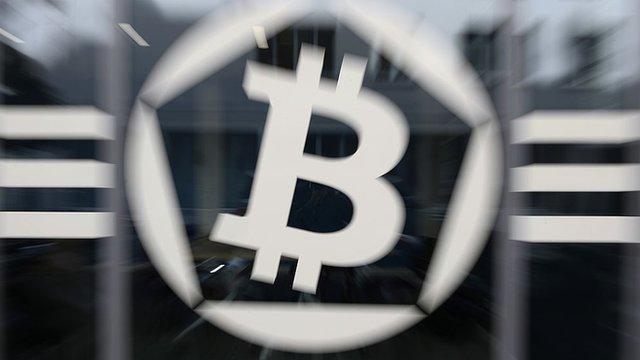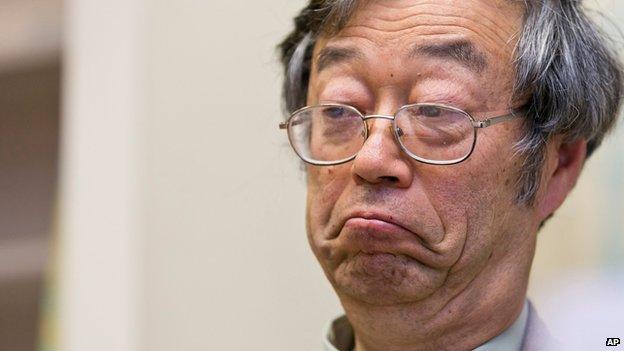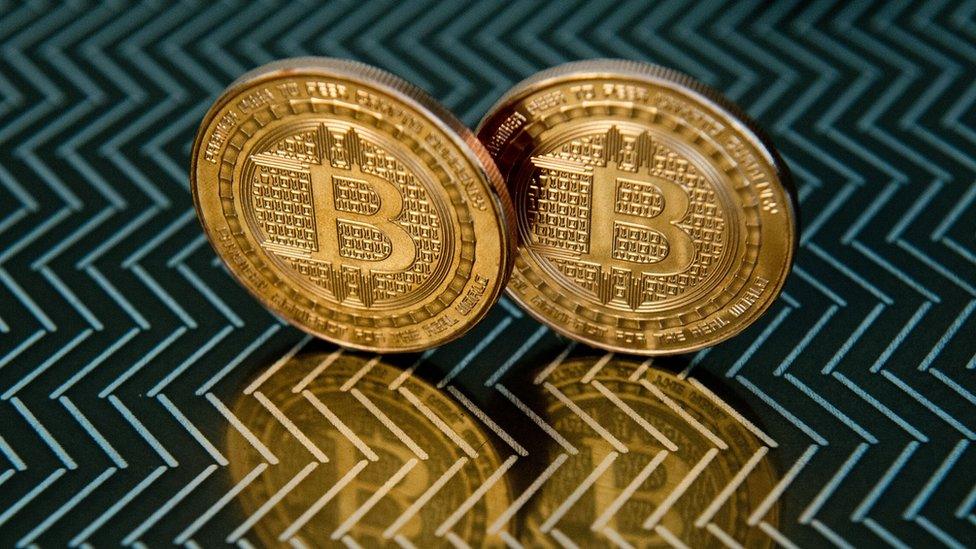The long search for Satoshi Nakamoto
- Published
Australian entrepreneur Craig Wright says he is Mr Bitcoin
The dollar value of individual bitcoins may have fluctuated wildly since their creation but there is one facet of the virtual currency that has only ever accrued more and more interest - the question of who invented it.
For the first two years of the project, the originator of Bitcoin's core ideas, who adopted the name of Satoshi Nakamoto, was very active on the cryptography forums where the underlying code of the protocol was critiqued, tested and improved.
Satoshi worked with Hal Finney, James Donald, Nick Szabo, Ray Dillinger and many others to refine the core code and turn the fledging technology into a robust, anonymous, decentralised payment system.
And then in early 2011, Satoshi stepped away from what he had created. His parting words in an email were that he had "moved on to other things".

Bitcoins are gradually being accepted in more and more places
At that time, one Bitcoin was worth about $29 (£20). But with online shops, banks and payment processors starting to accept them they steadily gathered value. Now, each one is worth about £305 having declined from a peak in December 2013 when a Bitcoin was worth £843.
As more coins were mined, more shops accepted them, and as the profound possibilities of the Bitcoin system became apparent, the frenzy around Satoshi's real identity has grown.
Roll call
In 2011, The New Yorker said Satoshi was either Finnish economist Dr Vili Lehdonvirta or Michael Clear, a graduate student in cryptography at Trinity College, Dublin. Both strongly denied being Satoshi.
Later the same year, Fast Company amassed evidence suggested Neal King, Vladimir Oksman and Charles Bry could be Satoshi. All three denied it.

Why Satoshi Nakamoto?
Craig Wright said the pseudonym he adopted is derived from two sources. The first name, Satoshi, is from Japanese Manga comics but he has not said which character or series it draws on.
The second name is taken from an obscure 18th century Japanese philosopher Tominaga Nakamoto who stood at odds with the views of his time. Mr Wright said he has some sympathy with Nakamoto's outlook on life.

Speculation then cooled for a while until 2013 when the name of Japanese mathematician Shinichi Mochizuki was put forward as a candidate. He too said he was not Satoshi.
The same year saw a flurry of articles and papers all naming different people as candidates. Gavin Andresen, Jed McCaleb and Dustin Trammell were all mentioned as possibles. All denied it.
A claim was put forward for Ross Ulbricht, creator of the Silk Road drug-selling website, as a potential Satoshi. This claim was later retracted.
In December 2013, a blogger analysed the writing styles of many crypto-coin related academic papers in a bid to work out who might have written the early Bitcoin documents. He said this evidence pointed to computer scientist and cryptographer Nick Szabo as a potential candidate.
In March 2014, Newsweek said its investigation proved that a Japanese-American man called Dorian Prentice Satoshi Nakamoto was Bitcoin's creator. A physicist by training, Mr Nakamoto had also worked on computer finance and classified defence projects.

Dorian Satoshi Nakamoto was wrongly identified as the inventor of Bitcoin in 2014
The story led some media outlets to camp outside Mr Nakamoto's house and then pursue him in a car chase when he declined to answer questions. The feverish interest provoked the real Satoshi to intervene. He declared in an email sent from an account known to be connected to him: "I am not Dorian Nakamoto."
Later in the same year, cryptographer Hal Finney was suggested as a candidate for Satoshi. The claim was made after journalist Andy Greenberg from Forbes compared the writing styles from the early Bitcoin papers with those of Mr Finney - the resemblance was closer than any other candidate.
But Mr Greenberg retracted his claim after meeting Mr Finney and reviewing evidence from the early days of Bitcoin. Hal Finney died in 2014.
Craig Wright's name as a potential Satoshi came to light in December 2015 after two tech magazines, Wired and Gizmodo, wrote about him after being passed documents and emails that are believed to have been stolen from him. Mr Wright did not respond to press enquiries after these stories. Many people in the Bitcoin community were unconvinced by the evidence.
It is not yet clear if Mr Wright's going public on 2 May 2016 and claiming to be Satoshi will still this debate.
- Published19 February 2016

- Published19 January 2016

- Published19 January 2016

- Published22 January 2016
